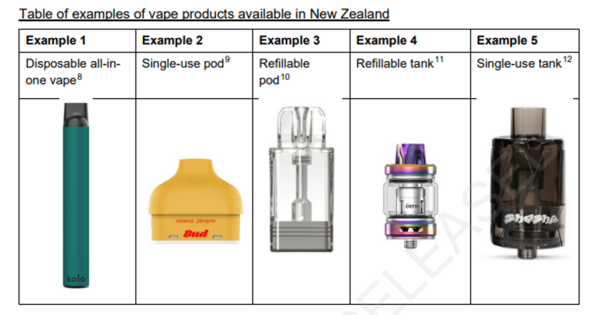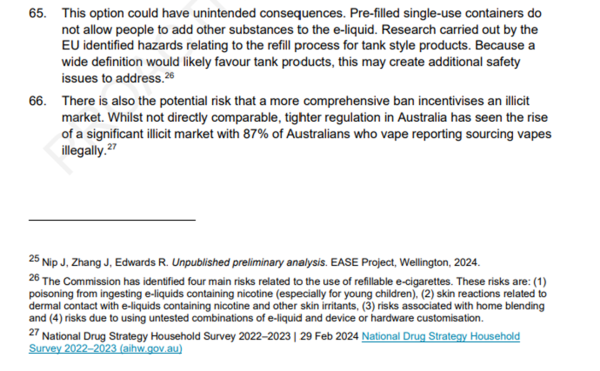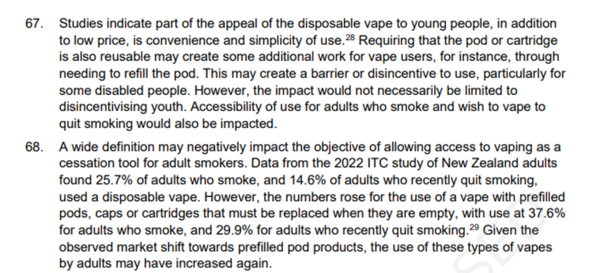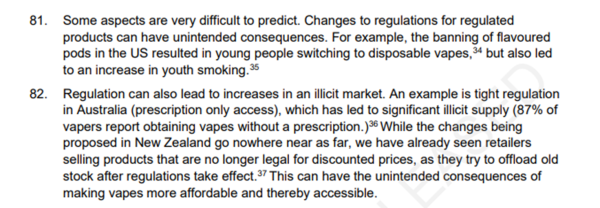Sometimes bad policy is good politics. At least over relevant political time horizons. Problems that only emerge in the future will be for some future government to deal with.
And sometimes it’s a mistake on both counts.
Under pressure about youth vaping, National has proposed legislation that will ban the vaping devices used by most adults who vape. It is both terrible policy and a political mistake that will hit them in 2026.
If you want to understand why, read the Ministry of Health’s Regulatory Impact Statement on the legislation, released late last week.
The Ministry focuses on the policy’s effects – both those that the government intends, and the very foreseeable collateral damage of the government’s proposed approach.
The rod National is building for its own back is obvious.
But we should start with a bit of the policy history.
The Regulatory Impact Statement covers two sets of policies targeting youth vaping. Cabinet agreed to one set of policies in March 2024, which the Ministry of Health broadly supported. But a second set of Cabinet decisions in June, which set a broad ban on most vaping devices, will backfire.
In March, Cabinet agreed to increase penalties for retailers selling vapes to minors. It would also ban disposable vaping products, which were then defined as vapes that are neither rechargeable nor refillable: single use vaping sticks. Disposable vapes are cheaper than other devices and are currently popular among youths who vape.
The Ministry supported increased fines for retailers who sell to minors, noting in the Regulatory Impact Statement that the current level of fines “does not appear to be a strong deterrent.”
It also supported the ban on single-use disposable vapes, in combination with other measures. It noted that disposables are popular with youths because they are cheaper, and that if the government wants to increase the cost of vaping, minimum pricing or excise are more effective.
However, measures aiming to increase cost have trade-offs: if the government wants adults to keep shifting from smoking to vaping as harm-reduction, the Ministry reminds the government that “ease of use and low price are important factors”.
The Regulatory Impact Statement notes that the analysis was constrained. Cabinet had already made its decisions, so the Ministry only assessed the impact of agreed policies. Other policies that might target youth vaping were not considered.
And that left an obvious hole. The Ministry cites the ASH Year 10 survey showing that most vaping youths get their vapes from friends (40%) or family (18.5%). The legislation does not address this kind of ‘social supply’. Fewer than 15% of vaping youths reported having purchased their vapes from a retail outlet.
The Ministry did not note other ways of addressing social supply, perhaps because Cabinet had already decided on an approach. I had proposed one option in August, which would tighten current rules on social supply.
In late June, Cabinet agreed to a much broader ban on vapes. The Ministry provides a helpful illustration for those who, like me, do not vape.
In March, Cabinet agreed to ban the disposable all-in-one vapes illustrated in Example 1. In June, Cabinet extended the ban to single-use pods and tanks, like Examples 2 and 5.

Click to view
If you want to understand why, read the Ministry of Health’s Regulatory Impact Statement on the legislation, released late last week.
The Ministry focuses on the policy’s effects – both those that the government intends, and the very foreseeable collateral damage of the government’s proposed approach.
The rod National is building for its own back is obvious.
But we should start with a bit of the policy history.
The Regulatory Impact Statement covers two sets of policies targeting youth vaping. Cabinet agreed to one set of policies in March 2024, which the Ministry of Health broadly supported. But a second set of Cabinet decisions in June, which set a broad ban on most vaping devices, will backfire.
In March, Cabinet agreed to increase penalties for retailers selling vapes to minors. It would also ban disposable vaping products, which were then defined as vapes that are neither rechargeable nor refillable: single use vaping sticks. Disposable vapes are cheaper than other devices and are currently popular among youths who vape.
The Ministry supported increased fines for retailers who sell to minors, noting in the Regulatory Impact Statement that the current level of fines “does not appear to be a strong deterrent.”
It also supported the ban on single-use disposable vapes, in combination with other measures. It noted that disposables are popular with youths because they are cheaper, and that if the government wants to increase the cost of vaping, minimum pricing or excise are more effective.
However, measures aiming to increase cost have trade-offs: if the government wants adults to keep shifting from smoking to vaping as harm-reduction, the Ministry reminds the government that “ease of use and low price are important factors”.
The Regulatory Impact Statement notes that the analysis was constrained. Cabinet had already made its decisions, so the Ministry only assessed the impact of agreed policies. Other policies that might target youth vaping were not considered.
And that left an obvious hole. The Ministry cites the ASH Year 10 survey showing that most vaping youths get their vapes from friends (40%) or family (18.5%). The legislation does not address this kind of ‘social supply’. Fewer than 15% of vaping youths reported having purchased their vapes from a retail outlet.
The Ministry did not note other ways of addressing social supply, perhaps because Cabinet had already decided on an approach. I had proposed one option in August, which would tighten current rules on social supply.
In late June, Cabinet agreed to a much broader ban on vapes. The Ministry provides a helpful illustration for those who, like me, do not vape.
In March, Cabinet agreed to ban the disposable all-in-one vapes illustrated in Example 1. In June, Cabinet extended the ban to single-use pods and tanks, like Examples 2 and 5.

Click to view
Or you could perhaps think of it this way. A disposable all-in-one vape is a bit like a pre-mixed coffee in a can. Single-use pods and tanks are a bit like a Nepresso: buy the Nepresso machine, buy some coffee pods, put the pod in the machine, and it’s hard to screw it up. And a refillable system is like a complicated espresso machine: great for those who like spending 10 minutes making the perfect coffee to their exact specification and learning all the intricacies of pressure and temperature, but not ideal for anyone else.
The Ministry warns about the more extensive ban.
It notes that pre-filled vapes have fewer risks around accidental exposure to vape fluid, accidental ingestion, and other substances winding up in the vape. It also warns that a comprehensive ban risks incentivising an illicit market.

Click to view
The Ministry reminds government that bans on devices do not only apply to youths. The ban also applies to adults who have shifted from smoking to pod-based vapes. Those who have yet to quit smoking will have one fewer option.

Click to view
It later warns that the broader prohibition “may reduce the appeal to use vapes in smoking cessation” and that “any decrease in switching to vaping may see an increase in poor health outcomes for those who continue or return to smoking.” It also warns that some other unintended consequences can be difficult to foresee, giving the example of a ban on flavoured pods in the US resulting in youths switching to disposable vapes and to increases in youth smoking.

Click to view
And here is where we shift from the measures just being poor policy to their also being a political mistake.
Under the prior Labour government, Health Minister Verrell had legislated a ban on cigarettes that contain any appreciable amount of nicotine, an annual increase in the age limit for smoking, and reductions in the number of retail outlets allowed to sell cigarettes.
Measures from that legislation had not come into effect by the time of last year’s election. And, to some surprise, the incoming government’s coalition agreements reversed that legislation while committing the government to considering a broader range of reduced-harm alternatives to smoking.
Labour strongly opposed the government’s reversal of its legislation, claiming its legislation was needed to continue the path to Smokefree 2025.
Many ex-smokers use the vaping systems that National is set to ban. Smoking rates could well be increasing again in the lead-up to the 2026 election. If smoking rates are on the rise, Labour will have its choice of rod with which to beat National. It could point to the vaping rules, or to the coalition’s reversal of Minister Verrell’s legislation, or both.
The legislation might provide the government with a temporary reprieve from parents and teachers worried about youth vaping. But the Ministry of Health’s Regulatory Impact Statement suggests the ban is far broader than is really necessary. If the government does not reconsider its options through the select committee process, it may yet find that bad policy becomes bad politics.
Dr Eric Crampton is Chief Economist at the New Zealand Initiative. This article was first published HERE


No comments:
Post a Comment
Thank you for joining the discussion. Breaking Views welcomes respectful contributions that enrich the debate. Please ensure your comments are not defamatory, derogatory or disruptive. We appreciate your cooperation.